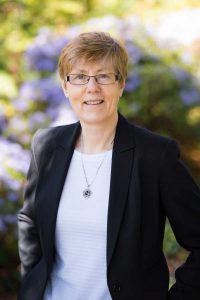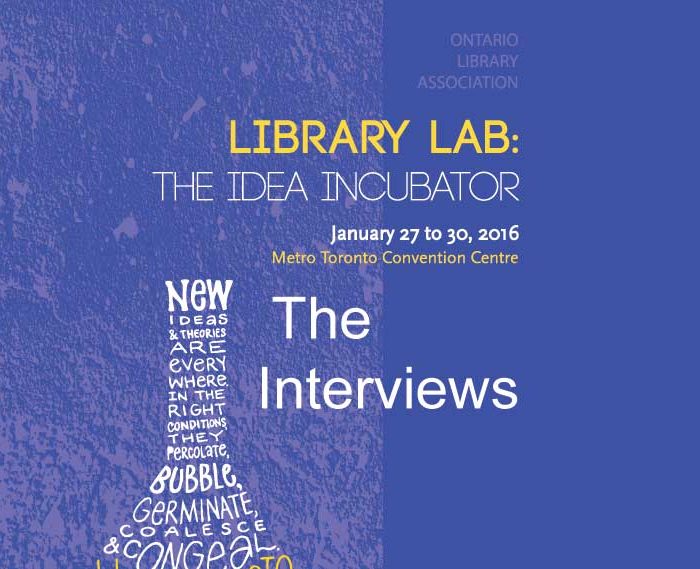Miranda Hill is changing Canada's literary landscape .... quite literally. As Executive Director of Project…

Caroline Haythornthwaite, OCULA Spotlight, Super Conference 2016
Caroline Haythornthwaite is Professor, School of Library, Archival and Information Studies, The iSchool at The University of British Columbia where she served as Director from 2010 to 2015. She has an international reputation in research on e-learning, virtual community, and distributed knowledge from a social network analysis perspective, and the impact of computer media and the Internet on work, learning and social interaction.
Current initiatives include her role as a founding member with the Society for Learning Analytics Research an organization focused on exploring the role and impact of analytics in support of teaching, learning and academic achievement.

Describe your favourite memory or experience with a library.
Now that you are asking me to remember, there are many such experiences, and the range of them says something about the variety of activities the library supports. Chronologically, I’ll start with my years at Trent University in the academic library – study space, resource space, meeting space – I spent many hours in a library carrel, reading, writing (by hand!), and laying the groundwork for a (then distant) future career as an academic.
Fast forward to the next set of memories which are about many visits with my young daughter from our house to the nearby Lorne Park branch of the Mississauga library. A delightful family place to visit and enjoy. If I limit myself to adding just one more, it a behind the scenes tour of the Winchester School library in England, a school with a 600 year history and the books to match. A truly rare treat!
How has reading made a difference in your life?
Surprisingly, I have always been a slow reader. Finishing reading a 56-page book (still remember the number of pages!) in the 4th grade launched me into taking the time to read. While I’ve never thought of myself as a ‘nose in the book’ kind of person, through my late teens and 20s I took up with foreign writers of long books (in translation) – Russian, German, Japanese. A few 100 pages is just the initial down payment on reading. I believe my reading of foreign writers has left a lasting attachment to exploring multiple cultures.
If you were a book, what genre would your story be?
We are always our own story, so it would have to be autobiography!
Tell me something that’s true, that almost nobody agrees with you on (for example, your favourite fact or something about yourself).
I want to reclaim the term ‘e-learning’ from its association with learning management systems the complex, wide array of activities that compose the contemporary learning landscape. E-learning encompasses learning on and through the Internet for formal, informal and non-formal learning, for degrees, certification, career, personal growth and interest.
It extends beyond retrieval of information to include contributing to knowledge crowds and communities, from delivering information to building shared knowledge. It signifies a radical change in who, where, when and with whom we learn, with ramifying effects on roles of authorities in knowledge gatekeeping and production, the role of experts and novices, and how we should be planning for learning in the future.
What’s the best idea you’ve “incubated” at a library?
A few years ago, I was co-organizer with Jacqueline van Dyck, then with the BC Ministry of Education, and Annette deFaveri, then President of BC Library Association, on a summit titled “Changing Times: Inspiring Libraries”. We came together around the need to inspire exploration and implementation of new perspectives into libraries and library practice – including new learning practices as above.
Many are engaged in bringing new activities and programs to libraries and the library field and we hoped that summit incubated some energy and determination in attendees to continue to explore and implement new practices.
Tell us why analytics are important in teaching, learning, and academic achievement.
Every time we complete an action online – buying, selling, communicating – we are leaving data traces that can be analyzed to draw conclusions about behaviour. Analyses of these data have the potential to provide great insights into human behaviour, letting us put new datasets together to examine activity on a wider scale, with potential highly positive outcomes for understanding human behaviour.
While we generally know now this is happening, we are also only just beginning to understand the ramifications of being able to collect such data, e.g., on privacy, ownership of data, and ownership of ideas, and on the use of analytics and the results, e.g., the validity and reliability of the analytic measures in relation to behaviour being examined.
The same potential and issues are present for learning. Every online interaction completed in the service of learning within an educational setting – library use, online class discussion, homework submissions, courses taken, wiki and blog contributions – can be harnessed to help educational and learning outcomes.
Learners may be able to create their own personal learning environments that let them track their own progress across multiple platforms; instructors may be able to view the networks of conversations in current classes, and even to compare with past or concurrent classes; educational units can track progress across years to completion to understand stopping or turning points in academic trajectories.
Each of these fits with the area of learning analytics. Defined for the first Learning Analytics and Knowledge conference, ‘learning analytics is the measurement, collection, analysis and reporting of data about learners and their contexts, for purposes of understanding and optimizing learning and the environments in which it occurs.’
If you could say one thing to all of Ontario’s library staff, what would it be?
Learning practices are changing. While many are prepared for this, too many are not, and too often the role of libraries in helping keep people current with contemporary learning is invisible. So, make your invisible work visible!
Why should Super Conference attendees attend your session?
My talk will focus on learning analytics and social networks, but this will not be confined to classroom learning. I will talk about learning on and through the internet and how we are all using new ways of learning, while also learning how to be e-learners. I believe libraries, librarians and information professionals will tacitly be given the social responsibility for e-learning literacies, and I hope that attending this session will give some new input for doing this job, and for making this aspect of the profession more prominent.
Annesha Hutchinson is the Marketing and Communications Coordinator for the Ontario Library Association. She currently tweets for @ONLibraryAssoc. She can be reached at ahutchinson [at] accessola.com.

